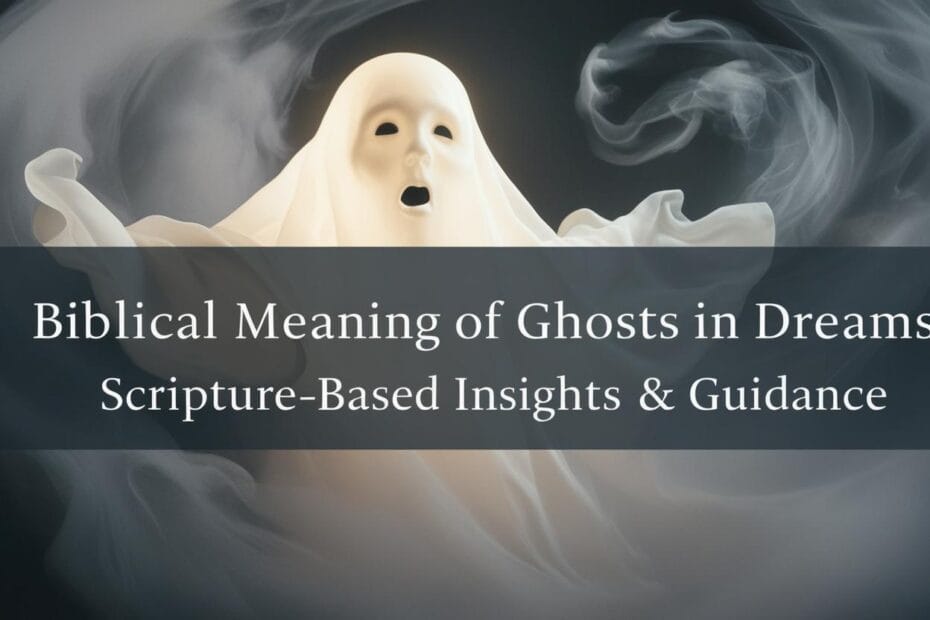Have you ever woken up from a dream about a ghost and wondered what it means? Dreams can feel mysterious, and seeing ghosts in them might leave you curious or even worried. In the Bible, dreams often carry spiritual messages, and understanding the biblical meaning of ghosts in dreams can offer comfort and guidance. This article shares simple, scripture-based insights to help you understand these dreams from a Christian perspective. Whether you’re new to the Bible or seeking deeper spiritual answers, we’ll look at what ghosts in dreams might mean and how they connect to your faith.
What Is the Biblical Meaning of Ghosts in Dreams?
In the Bible, dreams are often a way God speaks to people. However, the idea of “ghosts” as we see in movies—spooky spirits haunting the living—isn’t directly supported in scripture. Instead, when someone dreams of a ghost, it might point to spiritual or emotional messages. The biblical meaning of ghosts in dreams often relates to unresolved feelings, spiritual warnings, or God’s call to seek His truth.
The Bible teaches that when people die, their souls go to be with God or face judgment (Hebrews 9:27, NIV). This means the spirits of the dead don’t typically linger as ghosts. So, a dream about a ghost might not be a literal spirit but a symbol. For example, it could represent:
- Unresolved grief: Dreaming of a loved one who passed away might show you’re still processing their loss.
- Spiritual confusion: A ghost could point to false beliefs or fears that need God’s truth.
- God’s message: Like in Joseph’s dreams (Matthew 1:20, ESV), God might use a dream to guide or warn you.
In Luke 24:39 (NIV), Jesus says, “Look at my hands and my feet. It is I myself! Touch me and see; a ghost does not have flesh and bones, as you see I have.” This shows that even Jesus addressed fears about ghosts, pointing to His real presence instead. Dreams of ghosts, then, might invite you to seek God’s reality over fear or confusion.
Why Do Ghosts Appear in Dreams? A Biblical Perspective
Dreams are personal, and seeing a ghost can have different meanings depending on your life and faith. From a biblical view, these dreams might reflect something in your heart or spirit that God wants you to notice. Let’s look at some reasons ghosts might show up in dreams, grounded in scripture.
- Processing Loss: If you dream of a deceased loved one as a ghost, it might reflect grief. Ecclesiastes 3:4 (ESV) says there’s “a time to weep,” showing that mourning is part of life. God may use dreams to help you heal or find peace.
- Fear or Anxiety: Ghosts can symbolize fear. Philippians 4:6 (NIV) encourages us, “Do not be anxious about anything, but in every situation, by prayer and petition, with thanksgiving, present your requests to God.” A ghost dream might be a nudge to pray and trust God.
- Spiritual Warfare: Ephesians 6:12 (KJV) reminds us that we wrestle “against spiritual wickedness in high places.” A ghost in a dream could represent a spiritual attack or temptation, urging you to put on God’s armor through prayer.
- Seeking Closure: Sometimes, dreams of ghosts point to unfinished business, like forgiving someone who has passed. Colossians 3:13 (NIV) says, “Forgive as the Lord forgave you.” God might use a dream to prompt forgiveness.
Biblical scholar Matthew Henry notes that dreams can stir the heart to seek God’s wisdom. If you dream of a ghost, pray for clarity and ask God what He’s showing you.
Common Types of Ghost Dreams and Their Biblical Meanings
Ghost dreams come in different forms, and each might carry a unique message. Below is a table summarizing common ghost dreams and their possible biblical interpretations, based on scripture and Christian teaching.
| Dream Type | Description | Possible Biblical Meaning | Scripture Reference |
|---|---|---|---|
| Deceased Loved One | Seeing a parent, spouse, or friend who passed away. | Reflects grief or a need for closure. God may call you to trust His peace. | John 16:22 (NIV): “Your grief will turn to joy.” |
| Unknown Ghost | A shadowy or unfamiliar figure. | May symbolize fear or spiritual confusion. Seek God’s truth to overcome. | 1 John 4:1 (ESV): “Test the spirits to see whether they are from God.” |
| Threatening Ghost | A ghost that feels scary or harmful. | Could point to spiritual warfare or inner fears. Pray for God’s protection. | Psalm 91:5 (KJV): “Thou shalt not be afraid for the terror by night.” |
| Friendly Ghost | A ghost that seems kind or comforting. | Might represent God’s comfort or a memory of love, but test it against scripture. | 2 Corinthians 1:3 (NIV): “The God of all comfort.” |
Each dream is unique, so pray for discernment. As 1 John 4:1 (ESV) says, “Test the spirits to see whether they are from God.” If a dream feels unsettling, ask God to reveal its purpose.
How to Respond to Ghost Dreams as a Christian
If you’ve had a dream about a ghost, you might wonder what to do next. The Bible offers clear steps to respond with faith and wisdom. Here’s how you can approach these dreams in a way that honors God.
- Pray for Understanding: James 1:5 (NIV) says, “If any of you lacks wisdom, you should ask God, who gives generously.” Start by praying and asking God to show you what the dream means.
- Search the Scriptures: The Bible is your guide. Look for verses that connect to your dream’s themes, like fear, grief, or spiritual battles. Psalm 119:105 (ESV) calls God’s Word “a lamp to my feet.”
- Seek Godly Counsel: Share your dream with a trusted pastor or Christian friend. Proverbs 15:22 (NIV) says, “Plans fail for lack of counsel, but with many advisers they succeed.”
- Reject Fear: If the dream feels scary, trust God’s protection. 2 Timothy 1:7 (KJV) reminds us, “God hath not given us the spirit of fear; but of power, and of love, and of a sound mind.”
- Act on God’s Guidance: If the dream points to an action—like forgiving someone or praying more—obey God’s leading. John 14:23 (NIV) says, “Anyone who loves me will obey my teaching.”
By responding with prayer and faith, you can find peace and grow closer to God, even through mysterious dreams.
Are Ghost Dreams a Warning from God?
In the Bible, God sometimes uses dreams to warn or guide His people. For example, God warned Joseph in a dream to flee to Egypt with Mary and Jesus (Matthew 2:13, ESV). Could a ghost dream be a warning? It’s possible, but it depends on the dream’s context and your spiritual life.
A ghost dream might be a warning if it:
- Points to Sin: If the dream stirs guilt about unforgiveness or disobedience, it might be God calling you to repent. Acts 3:19 (NIV) says, “Repent, then, and turn to God, so that your sins may be wiped out.”
- Highlights Danger: A threatening ghost could symbolize a spiritual or emotional threat, like toxic relationships or false teachings. Jesus warns in Matthew 7:15 (ESV), “Beware of false prophets.”
- Urges Prayer: If the dream feels urgent, it might be a call to pray for yourself or others. 1 Thessalonians 5:17 (KJV) says, “Pray without ceasing.”
However, not every dream is a divine warning. Some dreams come from daily stress or thoughts (Ecclesiastes 5:3, NIV). To know if a ghost dream is from God, pray and compare it to scripture. If it aligns with God’s truth and prompts you to grow in faith, it might carry a message.
Cultural Views on Ghosts vs. Biblical Truth
Many cultures believe in ghosts as spirits of the dead who linger on earth. Movies, books, and folklore often shape how we think about ghosts, but these ideas don’t always match the Bible. As Christians, we must hold cultural views up to God’s Word.
- Cultural Beliefs: Some traditions say ghosts are restless spirits seeking justice or connection. Others see them as omens. While these stories are common, they can lead to fear or confusion.
- Biblical Truth: The Bible says the dead don’t roam the earth as ghosts. Ecclesiastes 12:7 (ESV) says, “The spirit returns to God who gave it.” Dreams of ghosts are more likely symbols of emotions or spiritual lessons than actual spirits.
- Testing Ideas: Deuteronomy 18:10-12 (NIV) warns against consulting mediums or spirits, calling it detestable to God. If a dream leads you to seek answers outside scripture, redirect your focus to God’s Word.
Christian author C.S. Lewis wrote that we should focus on God’s reality, not myths or fears. If cultural ideas about ghosts influence your dreams, pray for God’s truth to guide you.
Conclusion
Dreams about ghosts can stir curiosity, fear, or hope, but the biblical meaning of ghosts in dreams offers clarity and comfort. These dreams might reflect grief, fear, spiritual battles, or God’s guidance, but they’re not likely literal spirits. By praying, reading scripture, and seeking godly counsel, you can understand what God might be saying through these dreams. The Bible reminds us to trust God’s peace and truth, as John 16:33 (NIV) says, “In me you may have peace.” Whether your dream is a call to heal, forgive, or grow in faith, let it draw you closer to God. Take time to pray about your dreams and ask God to show you His purpose. Share this journey with your church community, and let God’s Word light your path.
References:
- Bible Gateway: www.biblegateway.com
- Matthew Henry’s Commentary: www.biblestudytools.com
- C.S. Lewis’s Writings: www.cslewis.com

